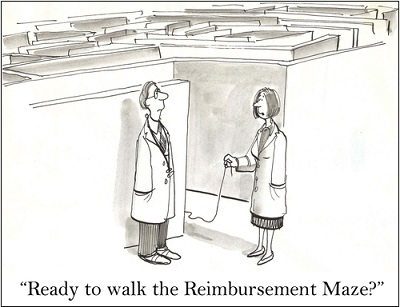Quality Payment Program (QPP) participants can now obtain information about whether their practice will receive a positive, negative, or neutral Medicare fee schedule adjustment in 2021 based on the 2019 data they submitted. The Centers for Medicare and Medicaid Services (CMS) announced that clinicians who participated in the Merit-based Incentive Payment System (MIPS) in 2019 can access their performance feedback by logging in to the Quality Payment Program website.
Get Feedback on Your 2019 Quality Payment Program Performance on September 22, 2020
Categories: radiology reimbursement, physician reimbursement, cms, Quality Payment Program, QPP, quality measures
In radiology, like all other medical specialties, proper documentation is critical to achieving appropriate reimbursement. If the proper terminology is no used or important descriptors are omitted from the radiology report, the physician may not get paid for the services he or she performed.
Categories: radiology reimbursement, physician reimbursement, radiology documentation, radiology
How to Document y-90 Radioembolization Cases to Maximize Reimbursement on October 17, 2014
Click here to read our October 2020
y-90 radioembolization article
Interventional Radiology Meets Radiation Oncology – The y-90 Story
When a physician is performing an interventional procedure valued in the range of $4,000 – $6,000 for the professional component, attention to thorough and accurate documentation is a requirement for maximal reimbursement. Each case presents its own individual set of circumstances and a well-constructed operative report will tell the story of the case step-by-step. Each artery or branch into which a catheter is placed for diagnostic imaging or intervention is assigned a separate CPT code, and so the operative report must describe with specificity each catheter placement. When these descriptions are in a logical, sequential order, certified coders say that this allows them to better understand every aspect of the case so they can then accurately identify and apply up to 45 CPT codes to maximize reimbursement for it. A descriptive evaluation of each artery supports payment of the codes that are submitted for reimbursement.
Categories: radiology reimbursement, radiology billing, physician reimbursement, radioembolization, interventional radiology, nuclear medicine, y-90
How New MPPR Rules Affect Your Radiology Practice Revenue on September 24, 2014
As private insurance payers begin adopting the Multiple Procedure Payment Reduction (MPPR) methodology that was implemented by Medicare several years ago, practices that are not ready could face a revenue loss of 25% or more for some services. Of specific interest to radiologists is United Healthcare, which announced in its May 2014 Network Bulletin that it would be expanding its MPPR to the professional component of imaging services in alignment with Medicare’s policy. This change will apply to United Healthcare’s Commercial and Community Plan. Originally the policy was to take effect in the third quarter of 2014 but under pressure from radiology advocacy organizations, United has now reported that implementation of the policy will be delayed until the fourth quarter of 2014. This brief reprieve provides radiology practices with an opportunity to lessen this detrimental impact on their revenue by improving their current processing methodologies before these changes take place.
Categories: radiology reimbursement, physician reimbursement, radiology coding, revenue cycle management
Participate in CMS Quality Programs Now, Avoid Medicare Reimbursement Penalties Later on June 11, 2014
Physicians’ Medicare reimbursement in the coming years will be impacted by their participation in CMS quality programs in 2014. Quality reporting programs such as PQRS, Meaningful Use and the new Value-Based Modification Program have allowed physicians to earn incentives for compliance with their requirements, but beginning in 2015 that carrot will become a stick. Medicare will apply penalties that reduce reimbursement for physicians that are eligible but do not participate in the programs. Payment reductions for 2015 have already been determined by participation in 2013, but there’s still an opportunity to take steps in 2014 to avoid a reduction in 2016 payments.
Categories: radiology reimbursement, physician reimbursement, regulatory, medicare reimbursement, medical billing
SGR Delay Averts 2014 Medicare Physician Reimbursement Cut on April 4, 2014
On April 1st, President Obama signed into law the Protecting Access to Medicare Act of 2014 that delays for 12 months a permanent repeal of the SGR and averts a 24% Medicare physician pay cut that was scheduled to begin April 1st. The bill also extends the 0.5% provider update until March 31st, 2015. Somewhat unexpectedly, the bill also delays ICD-10 implementation until at least October 1, 2015.
Categories: radiology reimbursement, physician reimbursement, medicare reimbursement
Radiology Billing – Don’t Lose Legitimate Revenue to the MPPR on May 29, 2013
In recent years, the Centers for Medicare and Medicaid Services (CMS) has broadened its use of the Multiple Procedure Payment Reduction (MPPR) methodology to reduce Medicare payments to physicians, but there may be situations where your practice can justify avoiding this payment reduction.
Categories: radiology reimbursement, radiology billing, physician reimbursement, regulatory, medicare reimbursement
Imagine that your radiology practice realized a $750,000 in underpayments in two years. Now consider the impact such a shortfall would have on your practice’s ability to grow or even sustain itself. In this actual case, a payer was reimbursing 10 of the group’s physicians correctly while underpaying another 15 for the same procedures at the same time. This is a vivid lesson in the importance of continually monitoring third-party payments to ensure payers are reimbursing you at your contracted rates.
Categories: radiology reimbursement, radiology billing, physician reimbursement, contract management, physician underpayments
Sequester Cuts Medicare Physician Reimbursement beginning April 1st on March 29, 2013
Physicians will begin to see their Medicare payments cut by 2% for services rendered beginning April 1st as the federal budget sequester takes effect. Their patients will still be responsible for co-insurance and deductibles at the same, pre-sequester level. For unassigned claims, reimbursements to beneficiaries would be subject to the 2% sequester reduction just like payments to physicians on assigned claims.
Categories: physician reimbursement, regulatory, medicare












